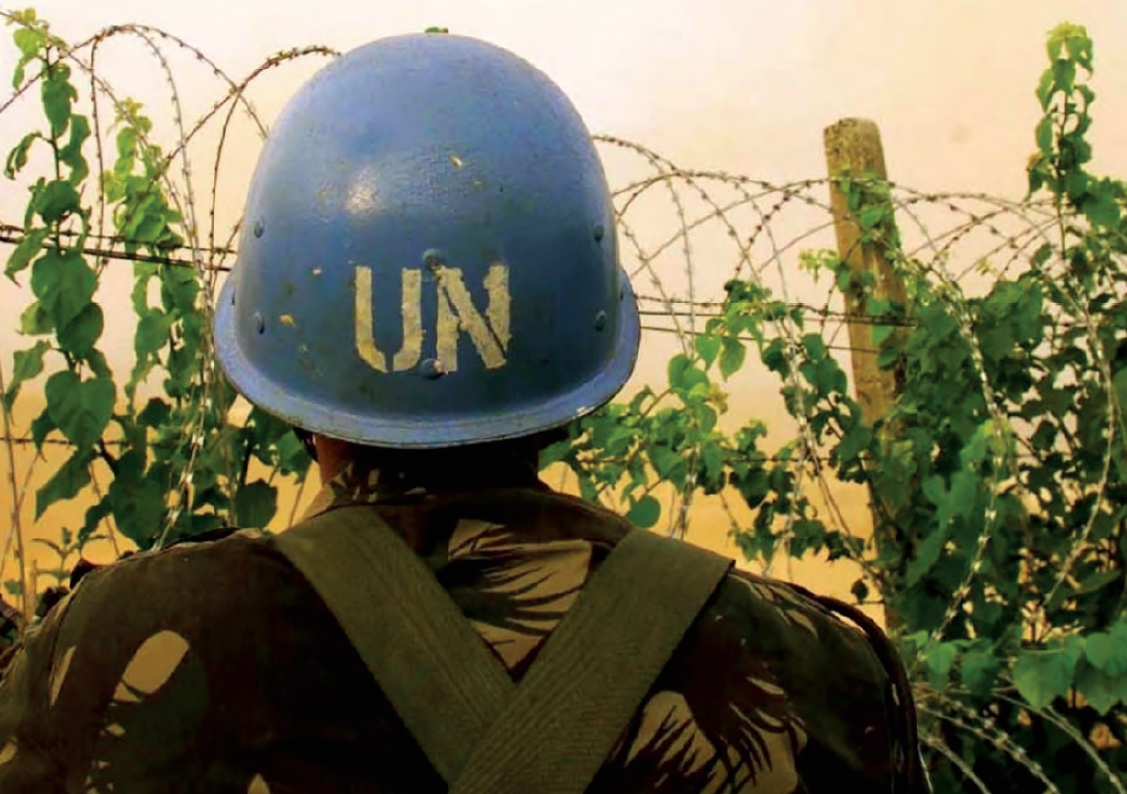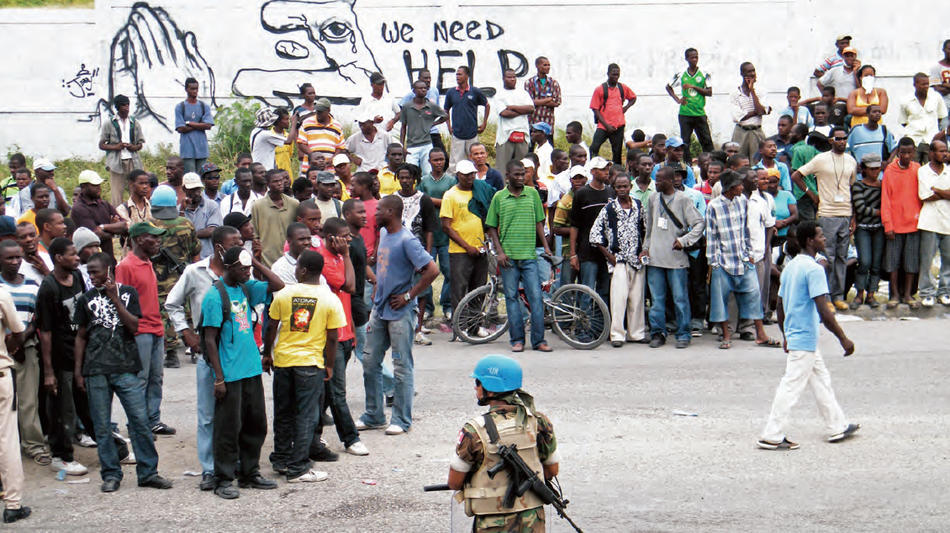
With US and NATO operations in Afghanistan slowly coming to an unsettling end, and the gap between rhetoric and action in Syria as wide as ever, the Western public has had enough of foreign interventions. The first decade of the twenty-first century may appear in hindsight as a peak of international activism that is unlikely to be matched. And yet there has been no precipitous decline in UN peacekeeping, as there was in the second half of the 1990s after the disasters of Rwanda, Somalia, and Yugoslavia. The international community may doubt the effectiveness of interventions, but is nonintervention an option? To many it seems callous, and it may well be strategically unwise.
Responsibility to Protect
“We are prepared to take collective action, in a timely and decisive manner, through the Security Council ... should peaceful means be inadequate and national authorities manifestly fail to protect their populations from genocide, war crimes, ethnic cleansing and crimes against humanity.”
These words, unanimously adopted at the 2005 United Nations World Summit, ring hollow today. The principle they describe, called the “responsibility to protect,” or “R2P,” emerged from the failures of governments to safeguard their own populations in such places as Rwanda and Bosnia, and spelled out the responsibility of the international community to step in when sovereign governments do not. Although the UN statement is qualified by a reference to the Security Council, whose authorization conditions any use of force, the declaration’s strong language gave hope that the council would feel obliged to act when the situation warranted. It has not acted. The divisions among the council’s permanent members run deep, especially as an increasingly assertive Russia annexes Crimea with one hand and bolsters the Bashar al-Assad regime in Syria with the other.
But the political divisions of the international community are not the only, and maybe not even the foremost, impediment to international action. General skepticism about intervention has been growing since the end of the George W. Bush administration. The time is gone when the international community, pushed by liberal interventionists, would be ready to endorse a responsibility to protect.
These qualms have been borne out not only by the combined experience of Afghanistan, Iraq, and Libya, but by a decade and a half of UN peacekeeping, which has reached unprecedented levels — there are more than one hundred thousand uniformed and civilian personnel stationed around the world. Much of the doubt stems from a simple question: do we know what we are doing? A decade ago, the Bush administration was intent on transforming the Middle East into a zone of peace and liberal democracy. This strategy now looks naive. Removing dictators, as in Iraq or Libya, is clearly not enough to ensure that a peaceful and harmonious society will emerge afterward; the most difficult phase, of course, is the one that follows an overthrow. Some countries have failed to recognize the vast regional implications of interventions: Iraq is now closer politically to Iran than to the United States, and the whole Sahel region of Africa, stretching from east to west across the northern part of the continent, has been destabilized by the flow of weapons from Libya.
Blessed Are the Peacekeepers?
The UN’s record is better than that of the US, but only by a little. Some countries in which peacekeeping forces were deployed in the last twenty-five years have stabilized over time. Namibia, Mozambique, Cambodia, and El Salvador are undoubtedly in better shape than they were before the UN interventions. Nepal has made a transition from a very nasty conflict, thanks in part to the UN’s mission there between 2007 and 2011, though the country remains fragile. Liberia, Sierra Leone, and Timor-Leste have made genuine, although not irreversible, progress. Even the Balkans, with the help of NATO and the European Union, have entered a more peaceful phase of their history.
But what about the Democratic Republic of the Congo, which after a decade and a half of UN engagement remains precarious, with extremely weak state structures? What about South Sudan whose creation was supported by the United Nations but is now on the brink of civil war? The state-building enterprise, which has led to increasingly ambitious and comprehensive mandates for the United Nations, has proved more complicated and costly than many had anticipated.
Acting Alone
If intervention seems desperately needed and consensus cannot be found in the Security Council, should an outside state take unilateral action? The charter of the United Nations is clear: states may use force in only two cases. First, if a state is attacked, it can respond with force, though it needs to inform the Security Council. Second, the Security Council itself can make the decision to use force — barring a veto from one of the five permanent members. Force may not be used in any other situation.
Of course, many countries have gotten around this. They can ignore the UN, or they can enlist puppet states for help. That’s what’s worrying about Ukraine. So long as Russia continues to say Viktor Yanukovych is the legitimate leader of Ukraine, it has a way to use force without demonstrating the need for self-defense. The prescriptions of the UN Charter have been flouted in the past, and they will be in the future.
Should the UN establish a doctrine that to prevent mass atrocities an outside state has the right to use unilateral force? This would unravel the legal order that was built in 1945, and that is a dangerous game; no doubt the doctrine would quickly be abused. We should stick to the UN’s original principles, keeping in mind that if ever another Hitler arises and no agreement can be found in the Security Council, someone will act nevertheless.
But we need to be careful. Saddam Hussein, awful as he was, was no Hitler. Bashar al-Assad isn’t, either. In Syria today, there are victims on both sides, although there are obviously more victims of the regime than there are of the opposition groups.
What if the UN Charter had been respected and there had been no Iraq War? The war ended an abominable regime, but look at the condition of Iraq today. What if the UN hadn’t intervened in Libya in 2011? Muammar al-Gaddafi’s regime was already a spent force, and the intervention unleashed a chain of violence. In time, biology would have taken care of both Saddam Hussein and Muammar al-Gaddafi.
When to Go In
Syria’s civil war has produced 2.5 million refugees and at least one hundred thousand deaths. How could this humanitarian disaster have been prevented?
Much more coordinated political pressure should have been brought to bear after the conflict began but before the demonstrators began calling for Bashar al-Assad’s departure. More should have been done to convince Assad to open up, as other dictators have done. But this would have required concerted political pressure from the international community, and frustratingly, when there’s no real violence, there is very little appetite for engaging at that early stage, when things can be fixed by lighter means.
Today, because so much blood has been spilled and there is deep hatred and fear on both sides, a negotiated solution is much harder to find. Assad is in a stronger position now than he was in 2012. Unless overwhelming force is used, as it was in Iraq, he won’t be removed. And if overwhelming force were used — which it won’t be, because there’s no support for it — it would be a leap into the unknown.
The least bad outcome at this stage is a negotiated settlement for a decentralized Syria. Assad, though stronger than the opposition, cannot regain control over the whole country, and the opposition cannot unseat him. Even if more weapons were given to the opposition, it would just prolong the fighting and raise the stakes. No sane person, and certainly not the Russians or the Iranians, wants a complete collapse of the regime.
If the international community commits to charting a course, it has to be Syrian-informed, but not Syrian-negotiated. Lakhdar Brahimi, who is the envoy of the UN secretary-general, or his successor needs to have the full support of the Security Council to consult quietly with the parties and shape a path to de-escalation and peace. That requires agreement among Russia, the US, and the other Western powers. This approach would allow the regime and the opposition to negotiate with the Security Council, which is easier than negotiating with each other. But this assumes an improvement in relations between the US and Russia, which is not as likely as it would have been a year ago.
A Defining Moment
Over the last two decades, the US and the UN have tested different types of engagement — from the purely diplomatic, as in Syria, where we have tried to give a nudge to the situation and have so far failed, to full military involvement. In between, there has been a range of integrated UN missions, which include both a military component and a development and humanitarian component. The lighter the footprint, the less leverage you have, but the heavier the footprint, the greater the commitment and risk.
We should tailor our ambitions to the long-term commitment we know we are prepared to make. Difficult situations require persistent and lasting efforts, yet too often we over-promise and under-deliver. Nothing is worse than creating high expectations, only to pull away when our goals prove too hard to reach. Better to commit less but stay on course.
We not only have limited political will, we also have limited knowledge, and we should be honest about this. We should not aim to re-engineer societies that we do not fully understand; there is a moral hazard in attempting to fundamentally alter the future of a society we do not know, while not having to suffer the consequences if we get it wrong. It’s like creating an earthquake that reshuffles and disorganizes everything.
The implication of this new pragmatism, based on a realistic assessment of our political will as well as our real capacities, would be a more focused and more limited agenda of international activism. The blunt instrument of force should not be excluded, but it should always be a last resort, because the chain reaction that it triggers will often surprise us. Limited goals, focused on ending deadly conflict and enabling distressed people to build peace on their own terms, have a better chance of gaining international legitimacy, building domestic support, and ultimately making a lasting difference for the people we want to help, and for the world we want to stabilize. If we do not want to fail, we may have to redefine what we call success.



